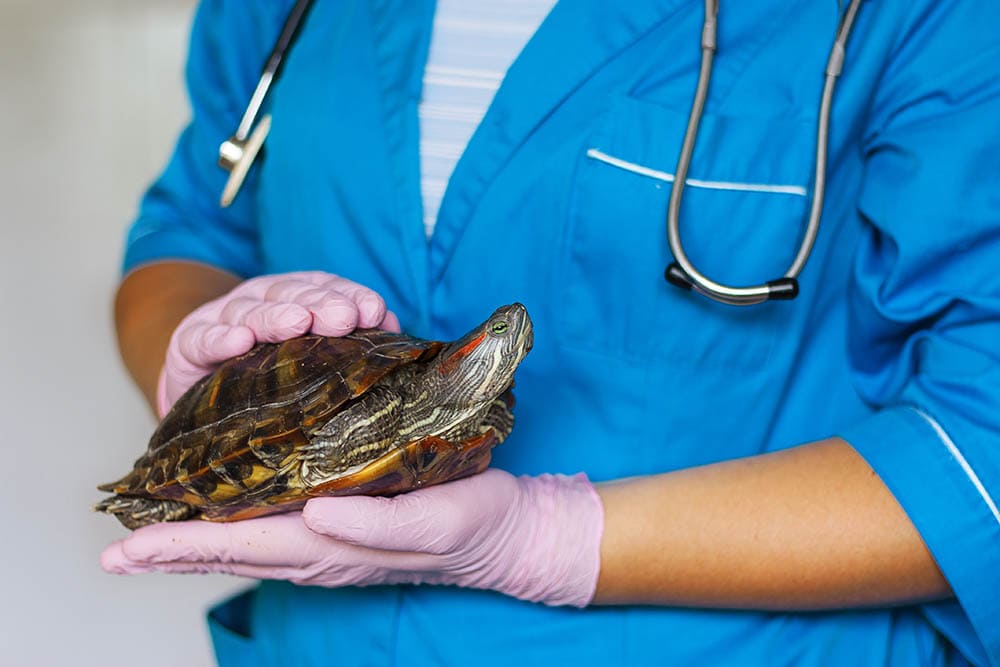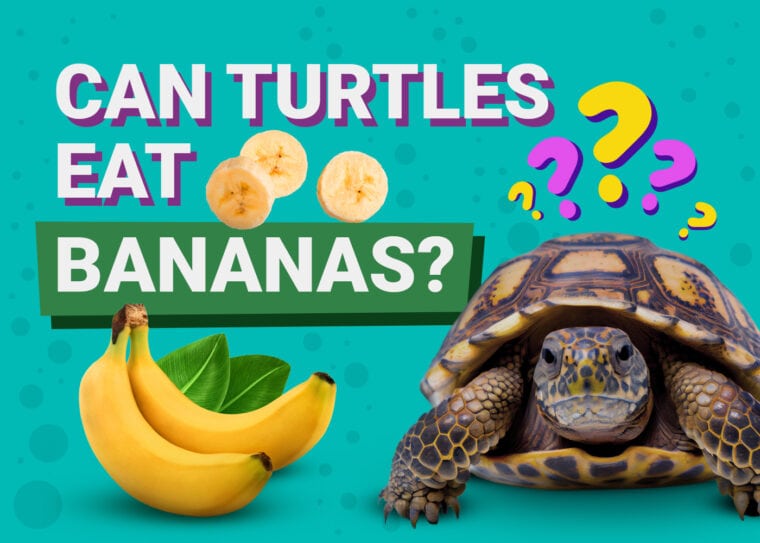
Turtles come in many different sizes and colors, but one thing every turtle has in common is a love of food. As a turtle owner, you want to make sure you feed your small friend only the best and most nutritious food to keep them healthy. As you prepare your turtle’s daily meals, what are some good options to offer?
One food you might consider feeding your turtle is a banana. Can turtles, including the ever-popular box turtle, eat bananas? Yes, bananas are a safe food for box turtles and other turtles as well, but they should only be fed in moderation.
Turtle Nutrition: The Basics
Unlike their tortoise cousins, who are primarily herbivores, turtles are mostly omnivores that need nutrition from both plant and animal sources. The ratio of plant to animal foods you should offer your pet will depend on the type of turtle, as well as their age and health. For example, a healthy box turtle often eats 50% plant-based foods and 50% animal-sourced foods.
Of the plant-based foods you feed your turtle, the majority should be vegetables rather than fruit like bananas. If given the choice, turtles—like many of us—would rather eat something other than vegetables. Fruit is not as nutritious as vegetables for turtles.
Feeding too much fruit can cause your turtle to fill up on sweet treats and fall behind on nutrition by neglecting to eat their vegetables!
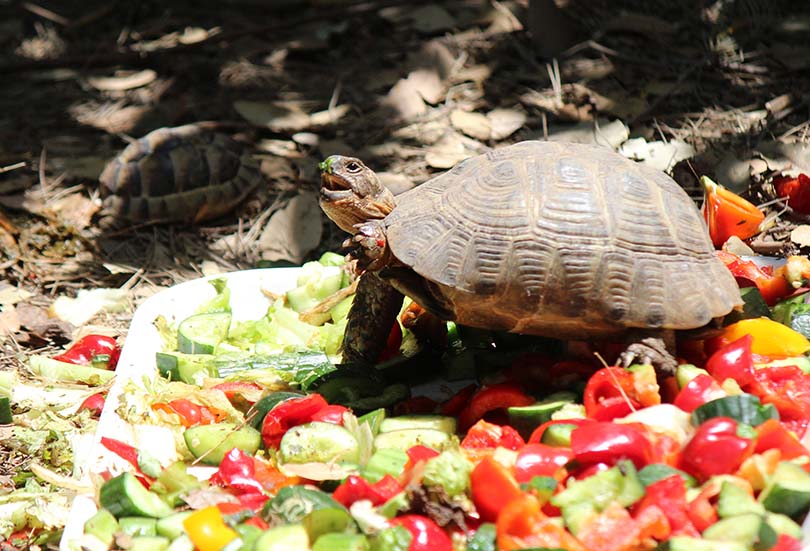
How to Feed Bananas to Turtles
To keep their enclosure as clean as possible, feed turtles in a shallow dish that can’t be overturned easily.
It’s a good idea to chop up better-tasting food like bananas and mix it in with other less delicious foods like vegetables. This makes it harder for the turtle to eat around the vegetables in favor of the bananas and other fruit.
Turtles can eat the entire banana including the peel! If you own a turtle, do your part to eliminate food waste by feeding your banana peel to your turtle instead of throwing it in the trash.
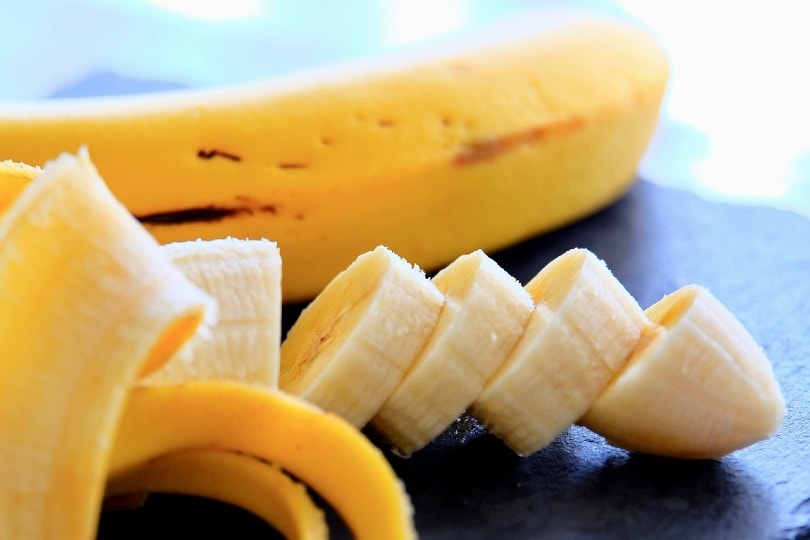
Other Plant Foods to Feed Your Turtle
Besides bananas, your turtle may enjoy a wide variety of plant-based food sources. Flowers, alfalfa hay, and various vegetables can all be offered. Dark, leafy greens such as collards, kale, and dandelion greens are the most nutritious vegetables and should make up the majority of the plant materials offered.
Besides the dark greens, you can offer your turtle smaller amounts of other vegetables such as carrots, cucumber, or squash. Avoid feeding lighter green vegetables such as iceberg lettuce, as they will fill your turtle up with little nutritional value to show for it.
Other fruits to offer besides bananas include berries, peaches, kiwi, and apples. Again, keep the ratio of fruits to vegetables heavily weighted toward vegetables as you meal prep for your turtle. Wash all fruits and vegetables before feeding. Turtles can eat vegetables either cooked or raw but raw is generally the most nutritious for them.
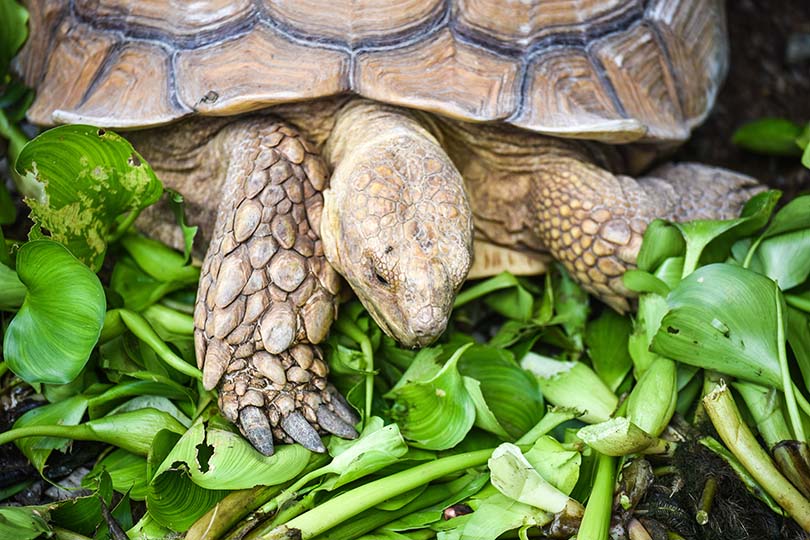
What About Animal-Based Foods?
It’s a good idea to check with your veterinarian to determine how much animal-based food to feed your turtle.
If your veterinarian does suggest feeding animal foods, here are a few to consider:
A commercial turtle pellet food can also be a good source of balanced nutrition.
Also, it’s not a good idea to catch bugs from your yard to feed your turtle. Wild insects may contain traces of pesticides or bug-killing chemicals that might be toxic to turtles. Purchase your turtle insect and worm meals from a pet store instead.

What Not to Feed Your Turtle
Besides wild-caught insects, what other foods should you avoid feeding your turtle? Well, turtles shouldn’t be fed human junk food or snacks, even if they might enjoy them. Don’t feed your turtle raw meat or dairy products such as yogurt or cheese.
Foods that are toxic to turtles and should never be fed include the following:
- You may also ask: Can Turtles Eat Tomatoes? What You Need to Know!
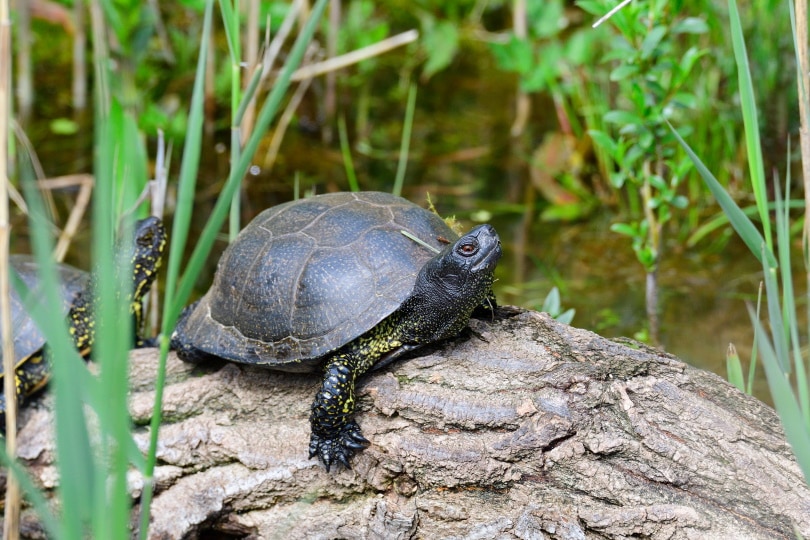
Do Turtles Need Any Supplements?
Ask your veterinarian what is best for your particular type of turtle. In many cases, it’s recommended that turtles receive a regular calcium supplement and often a multivitamin as well.
Don’t start giving your turtle any vitamins or other food additives without talking to your veterinarian first. Too much of a good thing definitely applies when it comes to turtles and vitamins. Over-supplementation of certain vitamins can do more harm than good and even be toxic.
Conclusion
Bananas can make a sweet addition to your turtle’s diet. Just make sure your wily turtle doesn’t ignore their other, more nutritious foods as a result. Turtles, such as box turtles, can make fun, easy-to-keep pets, but make sure you are ready for the responsibility of keeping your turtle healthy and safe. Sometimes that means not letting them eat as many bananas as they might like!
Related Reads:
- Can Turtles Eat Corn? Facts & Safety Guide
- Can Turtles Eat Cilantro? Vet-Reviewed Facts & Safety Guide





